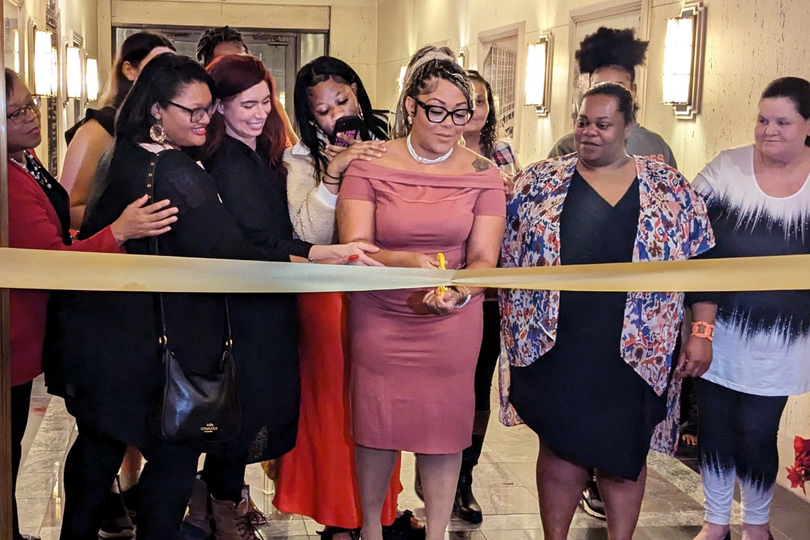HOP 23 gives free support to women recovering from incarceration, abuse

House of Psalms 23 was founded in 2022 to support women who have experienced incarceration or domestic abuse. Run by a small group of women each day, the nonprofit supports those in need with programs like therapy and financial workshops. Courtesy of Ashlee Haste
Get the latest Syracuse news delivered right to your inbox.
Subscribe to our newsletter here.
When Ashlee Haste was 14, she began working at Northside CYO, a nonprofit organization helping refugee children arriving from war-torn countries. It was a “sobering experience,” she said, working with children who had seen and been through so much, including a lack of basic necessities.
For Haste, supporting those in need became a lifelong mission.
“My mom taught me at an early age, if you have it, you can give back,” Haste said. “It’s always going to come back to you, so make sure that you help others.”
That message serves as a core principle for House of Psalms 23, the nonprofit Haste founded in 2022 to support women who have experienced incarceration or domestic abuse.
Operated daily by a group of three to four women, HOP 23 supports women in need through therapy, job readiness training and financial literacy workshops. Community donations and grants ensure each of its programs are free to all participants.
The organization works with Onondaga County Justice Center and Jamesville Correctional Facility to build trust with women before they complete their sentences, Haste said.
One of the women HOP 23 works with is Shamiari Horge, a 23-year-old Syracuse local who was pregnant with her fourth child at the time of her incarceration. Before she found HOP 23, she described her experience as a “real low point.”
“I was like, ‘No way you should be away from your kids and your family right now because of this,’” Horge said. “I didn’t even get a second bed until another pregnant female left. So it was just things like that. That was just really, really hard.”
While House of Psalms 23 is not a faith-based organization, it derives its name from scripture that Haste says is relevant to the challenges the women often face in recovery.
“It talks about enemies and being in those dark places,” Haste said. “The population that we work with, they run into that often. I think just in human nature, we all run into those dark places, whether we want to be in them or not.”
HOP 23 has helped over 300 women since its founding, and is currently working with over 40 people at Jamesville Correctional and the OCJF, Haste said. But recently, their work has been complicated by President Donald Trump’s scaling back of federal grants that support nonprofits.
Haste said HOP 23 was amid the application process for the Department of Justice’s Byrne JAG Award, a grant that would’ve provided funding to house all of the women participating in their programs. Instead, without warning, the DOJ backed out, leaving the nonprofit to continue searching for other funding sources.
Other state and federal grants have either been cancelled or face uncertain futures, Haste said. In the wake of these pullbacks, the HOP 23 staff has often worked without pay.
Despite these financial obstacles, Haste said women who are considering getting help from the nonprofit shouldn’t worry about it disappearing.
“(They should) know that they’re going to be able to rest their head and know that they’re going to be able to have a sisterhood of individuals that can really sit with them, talk with them.” Haste said. “They can laugh, let their hair down and understand that they can now trust someone in a community of individuals that want to help or have experienced the same things.”
Horge said she found out about HOP 23 after spotting a group of inmates with journals meeting with a member of the organization.
She learned the meeting was a women’s empowerment session led by Jennifer Oxendine, the nonprofit’s workshop facilitator, who teaches classes in correctional facilities. Out of curiosity, Horge joined in on the next session, and was stunned by the impact it left on her.
“Listening to Miss Jenn for the first time was actually really emotional for me,” Horge said. “Not just hearing her life story, but also connecting with her on another level as well … I just appreciated it so much knowing that I wasn’t out here by myself, knowing that all those women that (were) sitting inside of that group needed each other.”

Courtesy of Ashlee Haste
Nonprofit House of Psalms 23 provides vast programs like job readiness training and literacy workshops to support women who come from incarceration or domestic abuse. Due to donations and grants, each opportunity is 100% free to all.
Oxendine said her life story mirrors the many women who HOP 23 aims to help. She experienced incarceration, homelessness, abuse and addiction earlier in her life before moving from North Carolina to Syracuse seeking a better life for her and her kids.
When she first arrived in the city, Oxendine lived at the Chadwick Residence, a nonprofit organization that provides at-risk women with housing. It was there that she first met Haste, who was working as a program coordinator at the time.
The two stayed in touch as Oxendine found steady work and stable housing. A few years after their first meeting, Haste called her asking if she wanted to join the organization that would ultimately become HOP 23.
“I was like, ‘Wow, that’s awesome because that’s a part of my journey,’” Oxendine said. “Everything that the women that we work with (have experienced), I’ve been through a lot of the things they’ve been through, so it’s easier for me to relate to them.”
HOP 23 also works with a licensed clinical social worker who’s trained in working with recently incarcerated people and people who’ve experienced abuse. Though one-on-one sessions sometimes reach maximum capacity, Haste said there’s always an open spot in weekly group therapy sessions for processing and recovery.
For Horge, who was released last month, being able to open up to other women in similar situations has been invaluable, she said.
“It’s emotional because (there’s) so many things that they’re going through that not only I have to listen to, but they have to hear my side as well,” Horge said. “So hearing other stories and what they’ve been through and how they had to deal with it and the trauma that they still go through today, it’s really emotional.”
After the women graduate from the empowerment programs, they have the opportunity to become a part of Second Chance Sisters, a workforce development program designed to help them re-acclimate with the support of HOP 23 staffers.
Haste said the program teaches women entrepreneurial skills by making and selling body scrubs and lip glosses. They also gain firsthand experience working in the Second Chance Sisters store, which doubles as HOP 23’s headquarters.
The entire process is built around a shared philosophy, she said.
“We’re really heavy on the five C’s, so it’s building the courage, confidence, career, connection and communication,” Haste said. “That’s what we work on on a daily basis.”
Ashley Grimes, a HOP 23 board member, said one of the biggest challenges the nonprofit faces is gaining credibility and name recognition in the community.
“Sometimes people believe that women that were formerly incarcerated unfortunately (cannot) progress afterwards,” Grimes said. “But there is life after that. And I think sometimes people just need to be exposed to the truth.”
Horge said the organization has inspired her to start a podcast one day. She hopes it can serve as a space for everyone in her community to open up in a therapy-like environment.
She said her optimism for the future is a credit to HOP 23’s work, which she hopes continues to grow.
“They make me feel so loved every time I come here,” Horge said. “I would recommend (it to) anybody. I would tell that young lady or woman to go for it. If I can’t tell you anything, I would tell you to absolutely go for it. There’s ladies in there right now wanting to help you.”





